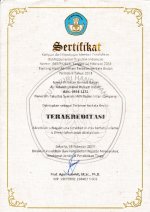Limitasi Keluar Rumah Bagi Perempuan ‘Iddah Wafat dalam Perspektif Maslahah Mursalah
Abstract
Keywords
Full Text:
PDF (Indonesia)References
Arsjad, Rasyida. “Iddah, Antara Agama dan Budaya (Studi Kasus Iddah Wafat di Kecamatan Sangkapura)”, Jurnal Lentera: Kajian Keagamaan, Keilmuan dan Teknologi 3, no. 1, (Maret 2017), h. 144.
As-Siddiqi, Hasbi. Pengantar Hukum Islam, Vol. 01, Jakarta: Rajawali, 2009.
Atabik, Ahmad. “Kontradiksi antar Dalil dan Cara Penyelesaiannya Prespektif Ushuliyyin.” YUDISIA: Jurnal Pemikiran Hukum dan Hukum Islam 6, no. 2 (2015), h. 263
Bisri, Abdul Mukti. “Konsep Ta’aqquli dan Ta’abbudi dalam Tafsir,” Akademika 8, no. 2 (2014): h. 231-240.
Bugha, Syeikh Mustafa al-. Al-Fiqhul Manhaji, Jilid IV, Bayrut: Dar al-Fikr, t.t.
Dahlan, Abdur Rahman. Ushul Fiqh. Jakarta: Kencana, 2010.
Djazuli, A., Ilmu Fiqh. Bandung: Orba Shakti, 1991.
Ghazali, al-. Al-Mustashfa min Ilmil Ushul. Bayrut: al-Risalah, 1997.
Husin, Syh Noorul Madihah Syed, dan Raihanah Azahari, “Pendekatan Islam dalam Memelihara Maslahah Wanita Selepas Kematian Suami.” Jurnal Syariah 18, no. 3 (2010), h. 482.
http://kupang.tribunnews.com/2016/01/07/pertumbuhan-jumlah-pekerjaperempuan-meningkat. Desember 2017.
Habibie, Bacharuddin Jusuf. Habibie dan Ainun. Jakarta: THC Mandiri, 2012.
Hartono, “Kompilasi Fatwa Ulama tentang ‘Iddah Wanita Hamil Karena Zina dan Kebolehan Menikahinya: Studi Komparatif Mazhab Syafi’iyyah dan Madzhab Hanabilah.” PhD diss., Universitas Islam Negeri Maulana Malik Ibrahim, 2012.
Herawati, Andi. “Maslahat Menurut Imam Malik dan Imam al-Ghazali(Studi Perbandingan).” Diktum: Jurnal Syariah dan Hukum 12, no. 1 (2014): 42-53.
Indar. “‘Iddah dalam Keadilan Gender,” YIN YANG Jurnal Studi Gender dan Anak 5, no. 01, (Juni 2010).
Ismail, Habib, dan Nur Alfi Khotamin “Faktor dan Dampak Perkawinan Dalam Masa Iddah (Studi Kasus di Kecamatan Trimurjo Lampung Tengah).” Jurnal Mahkamah: Kajian Ilmu Hukum dan Hukum Islam 2, no. 1 (2017): 135-160.
Jamaa, La. “Konsep Ta’abbudi dan Ta’aqquli dan Implikasinya Terhadap Perkembangan Hukum Islam.” Asy-Syir’ah 47, no. 1 (2013).
Jamhuri, dan Izzudin Juliara Izzudin Juliara, “Penggabungan ‘Iddah Wanita Hamil dan Kematian Suami (Analisis Terhadap Pendapat Mazhab Syafi’i).” SAMARAH: Jurnal Hukum Keluarga dan Hukum Islam 1, no. 1 (2017): 226-247.
Jumantoro, Totok. Kamus Ushul Fikih. Jakarta: Amzah, 2009.
Khaeruman, Badri. “Al-Qaradawi dan Orientasi Pemikiran Hukum Islam untuk Menjawab Tuntutan Perubahan Sosial.” Wawasan: Jurnal Ilmiah Agama dan Sosial Budaya 1, no. 2 (2016), h. 237.
Kholis, Nur. “Antisipasi Hukum Islam dalam Menjawab Problematika Kontemporer (Kajian Terhadap Pemikiran Maslahah Mursalah al-Ghazali).” Al-Mawarid 10, (2003).
Koto, Alaiddin. Ilmu Fikih dan Ushul Fikih. Jakarta: RajaGrafindo Persada, 2004.
Laluddin, Hayatullah, Mohamad Nasran Mohammad, Zuliza Mohd Kusrin, Shofian Ahmad, Zaini Nasohah, Mohd Zamro Muda, Md Yazid Ahmad, and Ahmad Muhammad Husni. “An Analysis on Maslaha’s Development Through of al-Ghazali Pre and Post al-Ghazali Periods.” International Business Management 6, no. 2 (2012): 187-193.
Lestari, Sri. Psikologi Keluarga. Jakarta: Kencana, 2012.
Maliubury, Zainuddin al-. Fath al-Mu’in. Surabaya: Al Haramain, t.t.
Maraghi, Ahmad al-. Tafsir Al Maraghi, Jilid II, Mishr: Mustafa Al Halabi, 1974.
Mohammadi, Fatemeh, dkk, “A Comparative Study of the Iddah (Waiting Period) in Iran Jurisprudence and the Laws of Other Countries,” International Research Journal of Applied and Basic Science (IRJABS) 6, no. 2, h. 237.
Nawawi, Ismail. Fikih Muamalah. Bogor: Ghalia Indonesia, 2012.
Nurdin, Zurifah. Ushul Fiqih 1. Jakarta: Rajawali, 2012.
Razi, Fakhruddin al-. Al Mahsul, Jilid II, Bayrut: Dar Kattab Ilmiah, t.t.
Robbani, Imdad, dkk. Formulasi Nalar Fiqh. Surabaya: Khalista, t.t.
Sabiq, Sayyid. Fiqih Sunnah. Surabaya: Al Haramain, t.t.
Shihab, M. Quraish. Tafsir Al Misbah, Jilid XIII, Jakarta: Lentera Hati, 2000.
Syarifuddin, Amir. Ushul Fiqh, Jilid II, Jakarta: Kencana, 2009.
Syâthibi, Abu Ishak al-. Al-I’tisham, Jilid II, Bayrut; Dâr al-Ma’rîfah, 1975.
Tihami, dkk, Fikih Munakahat. Jakarta: Rajawali Pers, 2010.
Turmudzi, Imam. Sunan al-Turmudzi, Jilid IV, Bayrut: Dar Kattab Ilmiah, t.t.
UU No. 1 tahun 1974 tentang Perkawinan. Bandung: Citra Umbara, 2009.
Umam, Chaerul, dkk, Ushul Fiqih. Bandung: CV. Pustaka Setia, 2000.
Yaqin, Ainol. “Urgensi Tarjîh dalam Istinbath Hukum Islam.” Al-Ihkam: Jurnal Hukum dan Pranata Sosial 10, no. 1 (2015), h. 113-114.
Yusuf, Muhammad. “Relevansi Pemikiran Ulama Bugis dan Nilai Budaya Bugis (Kajian Tentang ‘Iddah dalam Tafsir Berbahasa Bugis Karya Mui Sulsel).” ANALISIS: Jurnal Studi Keislaman 13, no. 1 (2017): 57-78.
Zaelani, Abdul Qodir. “Konsep Ta’aqquli dan Ta’abbudi dalam Konteks Hukum Keluarga Islam.” Asas: Jurnal Hukum dan Ekonomi Islam 6, no. 1 (2014).
Zahra, Abu. Ushul Fiqih. Surabaya: Al Hidayah, t.t..
Zulaikha, Siti. “‘Iddah dan Tantangan Modernitas”, Jurnal Hukum Istinbath 7, no. 1, (Mei 2010), h. 96.
Zuhaily, Wahbah. Fiqh Islam wa Adillatuhu, Jilid VII, Bayrut: Darul Fikr, 2014.
DOI: http://dx.doi.org/10.24042/adalah.v15i1.2161
Refbacks
- There are currently no refbacks.
Copyright (c) 2018 Al-'Adalah
Al-'Adalah is licensed under a Creative Commons Attribution-ShareAlike 4.0 International License.

1.png)

.png)
_(1).png)
_(1).png)

.png)
